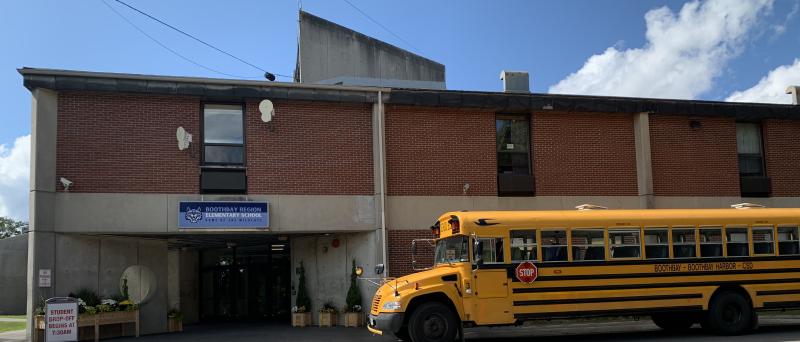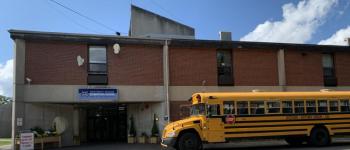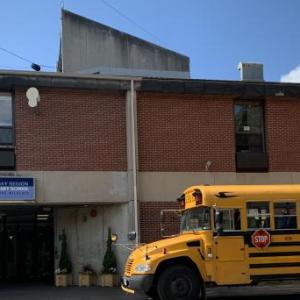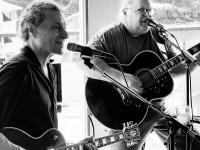Citizens air referendum grievances, elicit conversation
What could have been a heated argument turned into an example of civil disagreement April 14 as members of Citizens Deserve Options held a public forum on the upcoming $30 million referendum to renovate Boothbay Region Elementary School (BRES). Boothbay Harbor residents Patty Minerich and Denise Griffin hosted the event, attended by around 40 others who sat on either side, or somewhere in between, the issue.
According to Minerich, the Community School District (CSD) failed residents after the rejected bond vote in November. She said the new referendum is the same as the old and the district isn't listening to the voters’ will. Minerich said school officials broke their promises to collaborate with other towns around regionalization, propose a lean, repair-only approach and gather community input. She said the CSD held meetings that, while public, did not allow meaningful discourse.
Presenters also raised concerns with what they considered a lack of financial oversight and claimed the district has potentially misspent resources. They said annual audits are not routinely reviewed, trustees have complete discretion on how the $30 million bond would be spent, and trustees are discussing a “fast follow” second bond for high school repairs.
Superintendent Robert Kahler later told the Register the claims are wrong. He said financial audits are regulated and shared with the state and the boards, all board business is public and bond expenditures will be monitored by a clerk of the works, and reviewed by him and the boards. However, he said there may be a bond for essential repairs at the high school “nowhere close to the $30 million.” The school charter requires a referendum for all bonds over $250,000.
Members of both CSD boards said at the forum, they have welcomed community input, which has been public since conversations started around five years ago. According to the trustees, the April 24 referendum is for a different project than November’s, with some items removed and other more cost-efficient ones added.
However, Sunday’s presenters expressed trepidation with the burden of a $30 million bond for a school with low enrollment and no guarantee of increased student population, all in a community with many members living paycheck to paycheck or on a fixed income.
“We're very concerned, extremely concerned about being able to sustain the annual budget. Never mind the capital expenses,” Griffin said. “I don't know how we can sustain that and continue to pay good teachers if we have all these other capital expenses at the same time.”
Griffin said she has helped collect over 400 signatures from like-minded residents in a citizen’s petition. The petition calls for authorizing the trustees to begin another project, bonded up to $10,250,300, to renovate BRES if the April 24 referendum fails.
A related group has advertised a $10,250,300 million renovation proposal based on a 2021 existing conditions report from CSD project architects at Lavallee Brensinger. It lists $5,420,525 of estimated costs for critical BRES repairs including interior and exterior renovations, plumbing and security. In addition, it includes $3,794,368 of other costs, such as architectural fees and permitting, that the group said should be evaluated for necessity. The costs were adjusted for inflation.
Tom Minerich, a member of the group, said the figures are from early CSD conversations around what it would take to fix BRES; the numbers are estimates based on statewide averages and the costs for similar projects across Maine.
“(It’s) not to build something new, not to change the front entrance, not to do anything else, but strictly to fix the school's problems,” he said. “And the $10 million would do more than that to get rid of these things in the elementary school and fix these problems.”
At Sunday’s forum, presenters did not show a specific repair plan. They said they are not experts and do not have the funds to hire architects or create a better solution. “We are two citizens with 400 petition signatures of voters who don't feel like they're being given another option,” Patty Minerich said.
According to the presenters, the proposal is a starting point for a discussion.
“The purpose of the $10 million is to bring you to the table because you didn't come to the table after the November outcome,” Patty Minerich said to CSD board members. “You guys didn't like it. You repackaged it. It's back in front of us. That is not the message that we were sending in November. So, if it's $10 million, or it's $15 million, or there's three flavors, I think the voters deserve a legitimate option. And I'm not saying we have the answers.”
During the forum, attendees debated other cost-saving options including rising tuition rates for out-of-town students and regionalization, for non-elementary grades. However, attending members of both CSD boards said neither solution is simple.
School board member Bruce MacDonald said tuition students are a red herring. “I think we own the responsibility for our kids to look at our school and make a decision based upon our kids and our schools,” he said. “The other communities will not be helping. They cannot help. No one in Southport is going to pay for a building in Boothbay Harbor. Think about what the taxpayers there would say if they were asked by their school board to do that.”
Trustee Ronnie Campbell said regionalization would take years, while immediate repairs are needed at both schools. Trustee Troy Lewis said he understands the appeal but not how CSD taxpayers would convince adjacent towns when Boothbay and Boothbay Harbor have the highest student population. In addition, Lewis said if voters want to tackle tuition rates, the issue would go beyond the CSD.
“...You're going to have to deal with DOE (Department of Education), and the (tuition) formula is what it is,” he said. “You’ve got to talk to your legislature. There's really no sense of beating up school board members and complaining about it because there's nothing we can do about it.”
However, Griffin said it's not just about a voter’s choices but that they have more opportunity to make them. She proposed more community discussions and a non-binding referendum with multiple options. “That is a voter decision. With all due respect, it is our money. We should be able to make that decision, but that option is not before us. That’s the issue,” she said.


























